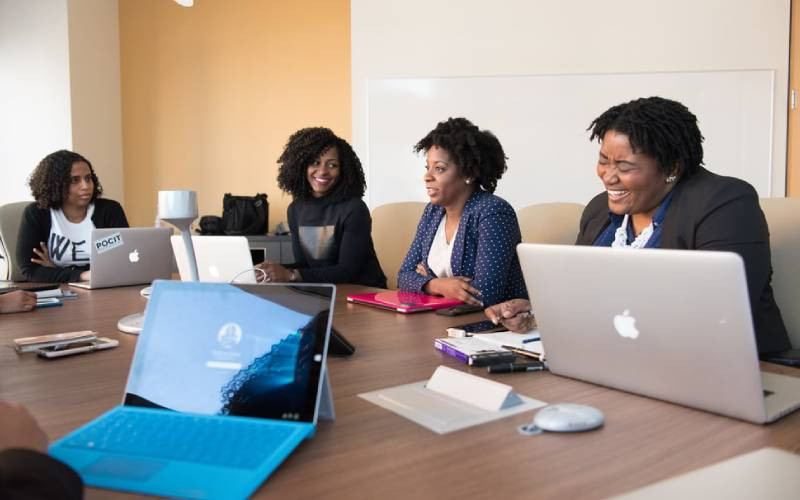
From the earliest days of electronic computing, computers were highly associated with women because typing on them and other such operations were mainly seen as secretarial, requiring fewer skills and largely unnecessary.
However, this quickly began to change as computers took centre stage in virtually all areas of industry and even government. As if suddenly clear that those who understood how to operate them had great power and influence, men phased out women, and effectively, they now control all sectors of computer programming.
All this is evident in a recently released UN report showing gender representation in the information and communication technology (ICT) field.
Women occupy far fewer tech positions and face a gender pay gap of up to 21 per cent. Furthermore, over 50 per cent of all women working in technology have reported incidences of workplace harassment.
According to the report, women are 18 per cent less likely than men to own a smartphone and even far less likely to access or use the internet.
In 2022, 259 million more men than women actively used the internet, and when it comes to technological careers, only 28 per cent of engineering graduates are women. Around 22 per cent of artificial intelligence (AI) workers globally are women, even though girls match boys' performance in science and technology subjects in many countries.
Worse, the majority of AI systems are biased against women. This fact has no better representation than when five years ago, the global retail giant Amazon's AI recruiting technology was reported to have developed a bias against women because it was trained majorly on men's resumes. Although Amazon shut the technology down, this mechanised sexism is still in full effect, according to the UN report.
Facebook and Instagram still allow the targeting of job adverts by gender, leading to discrimination in online job advertisements for traditionally male-dominated jobs such as security, computing and construction.
- How to handle parenting in a changing world
- What you need to know before donating blood
- Why dirty thirty is as real as it sounds
- What causes depression and how to tackle it
Keep Reading
Annually, March 8 marks International women's day (IWD), and this year's theme is "DigitALL: Innovation and technology for gender equality". The theme seeks to highlight the importance of technology in bringing gender issues to light. Participants across the globe will examine how gender equality, empowerment and sustainable development can be achieved in the digital era.
"Gender-based discrimination is a systemic problem that has been interwoven into the fabric of our political, social and economic lives, and the technology sector is no different," Mathu Joyini said during the 67th session of the commission on the Status of Women (CSW67) in which she is the chair.
For instance, here in Kenya, the hustler's fund launched years after the Women Enterprise Fund. Yet, the hustler's fund is highly digitised, giving a much lower interest rate. Only last Thursday, in light of this year's international women's Day theme, did President William Ruto commit to digitising it, lowering the interest rate to six per cent by cutting out intermediaries.
"Bringing more girls, women, and other marginalised groups into technology will result in more creative solutions and will have a greater potential for innovations that meet women's needs and promote gender equality," said Mathu.
"Strong representation of women in the labour market is fundamental because it gives women the opportunity to assert their rights in every aspect of their lives," she said.
Despite the benefits of digital representation of women, social media has unfortunately been reported as one of the most dangerous places for women. Fifty-eight per cent of female internet users have been harassed based on gender, according to Pew Research released in 2021.
"We must also squarely face the threats to the safety and well-being of girls that technology can present when abused. Even where they enjoy access to digital tools and services, discrimination has taken a foothold and continues to find new ways to deny them their rights," reads an article on the UN women's website.
"Women are underrepresented in Science, technology, engineering, and mathematics (STEM)," said Council of Governors chairperson Anne Waiguru last Thursday during the IWD commemoration in Kenyatta International Conference Centre (KICC), further calling for stringent measures against cyberbullying.
 The Standard Group Plc is a multi-media organization with investments in media platforms spanning newspaper print
operations, television, radio broadcasting, digital and online services. The Standard Group is recognized as a
leading multi-media house in Kenya with a key influence in matters of national and international interest.
The Standard Group Plc is a multi-media organization with investments in media platforms spanning newspaper print
operations, television, radio broadcasting, digital and online services. The Standard Group is recognized as a
leading multi-media house in Kenya with a key influence in matters of national and international interest.

